Today Current Affairs: 30th June 2021 for UPSC IAS exams, State PSC exams, SSC CGL, State SSC, RRB, Railways, Banking Exam & IBPS, etc
Table of Contents
Hardliner Ebrahim Raisi : Iran’s President:
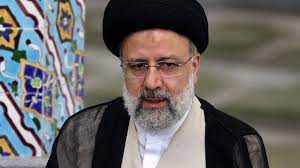
Hardliner Ebrahim Raisi became Iran’s president. He succeeded Hassan Rouhani.
- Iran’s 13th presidential elections were recently held.
- As per rules, the president should be a Shiite Muslim. Over 90 per cent of Iran’s population is comprised of Shiite Muslims.
- Raisi first came to prominence when he became the Prosecutor General of Karaj in 1980, when he became the Prosecutor of
- Tehran and the First Deputy to the Head of Judiciary from 2004 to 2014 after which he became the Prosecutor General of Iran from 2014 to 2016.
- In 2019, Raisi was appointed the head of Iran’s judiciary, an appointment that sparked concerns because of his involvement in the mass executions of thousands of political prisoners in 1988 after the Iran-Iraq war.
- Amnesty International has identified Raisi as a member of the “death commission” that carried out “enforced disappearance and extrajudicial executions of several thousand political dissidents in Evin and Gohardasht prisons near Tehran between late July and early September 1988. Victims’ bodies were mostly buried in unmarked mass graves.”
- Raisi also has ties to the paramilitary group Islamic Revolutionary Guard Corps (IRGC).
Sea Snot:
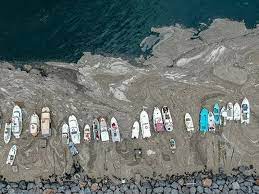
Turkey’s Sea of Marmara, that connects the Black Sea to the Aegean Sea, has witnessed the largest outbreak of ‘sea snot’.
- ‘Sea snot’ is marine mucilage, which floats up on the surface of the sea like a brown phlegm.
- This thick slimy layer of organic matter looks like a viscous, brown and foamy substance.
- It is formed when algae are overloaded with nutrients as a result of water pollution combined with the effects of climate change.
- The nutrient overload occurs when algae feast on warm weather caused by global warming. Water pollution adds to the problem.
- Overproduction of phytoplankton caused by climate change/rising temperatures and the uncontrolled dumping of household and industrial waste into the seas has led to the present crisis in turkey.
- The growth of the mucilage is posing a severe threat to the marine ecosystem of the country.
- It has caused mass deaths among the fish population, and also killed other aquatic organisms such as corals and sponges.
- Over a period of time, it could end up poisoning all aquatic life, including fishes, crabs, oysters, mussels and sea stars.
- Besides aquatic life, the ‘sea snot’ outbreak has also affected the livelihoods of fishermen.
- Some experts have also warned that the ‘sea snot’ can cause an outbreak of water-borne diseases such as cholera in cities like Istanbul.
One Nation, One Ration Card (ONORC) System:
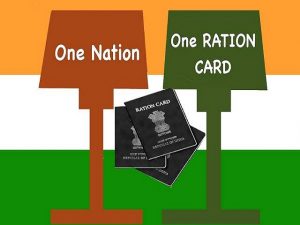
The Supreme Court directed all states and Union Territories (UT) to implement the One Nation, One Ration Card (ONORC) system by 31st July 2021.
- The scheme allows migrant labourers covered under the National Food Security Act (NFSA) to access food at any fair price shop with his or her ration card in any part of the country.
- The fundamental right to life under Article 21 of the Constitution may be interpreted to include the right to live with human dignity, having the right to food and other basic necessities.
- There are around 38 crore workers engaged in the unorganized sectors (National Statistics Office (NSO) data of 2017-2018).
- These unorganized workers did not have any permanent source of employment and have engaged themselves in small time vocations and occupations at various places away from their native places.
- Contributions of these labourers towards different projects, industries, make considerable additions in the economic development of the country.
ONORC System
- Under the National Food Security Act (NFSA), 2013, about 81 crore people are entitled to buy subsidised food grains – rice at Rs 3/kg, wheat at Rs 2/kg, and coarse grains at Re 1/kg – from designated fair price shops.
- However, NFSA beneficiaries were not able to access their PDS (Public Distribution System) benefits outside the jurisdiction of the specific fair price shop to which they have been assigned.
- By introducing ONORC, the idea was to reform the PDS, which has been historically marred by inefficiency and leakages.
Right To Reservation In Promotions For PwDs:
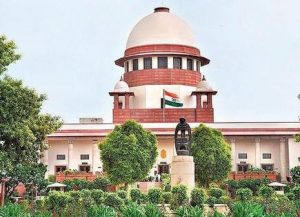
The Supreme Court of India has recently held that persons with physical disabilities have the right to reservation in promotions also.
- A disabled particular person can avail the advantage of reservation for promotion even when she or he was recruited within the common class or developed the incapacity after gaining employment.
- The case was based on a claim under the Persons with Disabilities (Equal Opportunities, Protection of Rights and Full Participation) Act, 1995.
- This Act has been replaced with the Rights of Persons with Disabilities Act 2016.
- The Kerala Administrative Tribunal rejected the plea of applicant stating that the rule of Recruitment in the State of Kerala, General Rules and other orders issued by the Government under Section 32 of the 1995 Act did not provide for any reservation in promotions.
- The Kerala High Court set aside the decision of the Kerala Administrative Tribunal.
- The 1995 Act recognizes the right to reservation in promotion.
- Identification of posts for reservation as per Section 32 of the 1995 Act is a prerequisite for appointment; but appointment cannot be frustrated by refusing to identify posts.
- The absence of provision for reservation in the recruitment rules will not defeat the right of a PwD as such right flows from the legislation.
- Reservation to promotion can be given to a PwD even if the person was not originally appointed in the PwD quota.
- Further, the responsibility to provide equal opportunities to disabled persons does not end with giving them reservation at the time of recruitment.
- Legislative mandate provides for equal opportunity for career progression, including promotion.
- Thus, it would be negation of the legislative mandate if promotion is denied to PwD and such reservation is confined to the initial stage of induction in service.
- This would in fact result in stagnation of the disabled in a consequential frustration.
PM Formalization Of Micro Food Processing Enterprises Scheme:
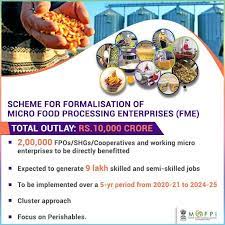
The Pradhan Mantri Formalisation of Micro food processing Enterprises (PMFME) Scheme, launched under the Atmanirbhar Bharat Abhiyan, completed its one year on 29th June.
- The PMFME Scheme is currently being implemented in 35 States and Union Territories (UTs).
- Nodal Ministry: Ministry of Food Processing Industries (MoFPI).
Features:
One District One Product (ODOP) Approach:
- The States would identify food products for districts keeping in view the existing clusters and availability of raw material.
- The ODOP could be a perishable produce based or cereal based or a food item widely produced in an area. E.g. mango, potato, pickle, millet based products, fisheries, poultry, etc.
Other Focus Areas:
- Waste to wealth products, minor forest products and Aspirational Districts.
- Capacity building and research: Academic and research institutions under MoFPI along with State Level Technical Institutions would be provided support for training of units, product development, appropriate packaging and machinery for micro units.
Financial Support:
- Upgradation of Individual Micro Food Processing Units: Existing individual micro food processing units desirous of upgrading their units can avail credit-linked capital subsidy at 35% of the eligible project cost with a maximum ceiling of Rs.10 lakh per unit.
- Seed Capital to SHG: Initial funding of Rs. 40,000- per Self Help Group (SHG) member would be provided for working capital and purchase of small tools.
- Implementation: Over a period of five years from 2020-21 to 2024-25.
- It is a centrally sponsored scheme with an outlay of Rs. 10,000 crore.
- The expenditure under the scheme would be shared in 60:40 ratio between Central and State Governments, in 90:10 ratio with North Eastern and Himalayan States, 60:40 ratio with UTs with legislature and 100% by Centre for other UTs.
National Thermal Power Corporation (NTPC):

National Thermal Power Corporation (NTPC) Limited has become the first energy company in the energy domain in India to declare its Energy Compact Goals as part of UN High-level Dialogue on Energy (HLDE).
- The United Nations is set to convene a high-level dialogue (HLD) in September, 2021 to promote the implementation of the energy-related goals and targets of the 2030 Agenda for Sustainable Development.
- NTPC is India’s largest power generating company which is under the Ministry of Power.
Energy Compacts (a platform to unite and connect commitments and actions):
- Energy Compacts are being mobilized by UN-Energy and will continue to be mobilized and updated throughout the current Decade of Action.
- These are ongoing or new commitments with clear, underlying actions that will advance progress on one or more of SDG7’s three core targets.
- SDG7 calls for “affordable, reliable, sustainable and modern energy for all” by 2030.
- SDG 7 three core targets: Access to energy, Renewable energy, Energy efficiency.
- These are voluntary commitments from Member States and non-state actors, such as companies, regional/local governments, NGOs, and others.
- Since affordable, clean energy is a prerequisite for achieving all other SDGs and the Paris Agreement, actions defined in an Energy Compact can be directly linked to Nationally Determined Contributions considered as SDG Acceleration Actions.
UN-Energy
- UN-Energy was established by the UN System Chief Executives Board for Coordination (CEB) in 2004 as the United Nations‘ mechanism for inter-agency collaboration in the field of energy.
- It seeks to act to support countries in achieving SDG7 and the interrelated goals of the Paris Climate Agenda and the broader SDG agenda.
- In September 2019, the United Nations General Assembly proclaimed the Decade of Action (2021-2030) to deliver the Sustainable Development Goals (SDGs) to accelerate efforts to deliver on the ambitious, universal and inclusive 2030 Agenda.
Not-For-Profit Hospital Model: NITI Aayog:
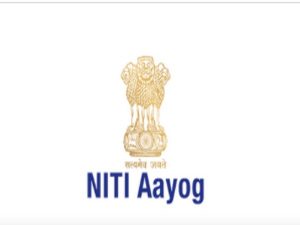
The NITI Aayog released a comprehensive study on the Not-for-Profit Hospital Model in the country.
- It is an initiative in a step towards closing the information gap on such institutions and facilitating robust policymaking in this area.
NITI Aayog
- It is a public policy think tank of the Government of India, established with the aim to achieve sustainable development goals with cooperative federalism by fostering the involvement of State Governments of India in the economic policy-making process using a bottom-up approach.
- It was established to replace the Planning Commission. The Prime Minister is its ex-officio chairman.
Major Findings:
- Most of the not-for-profit hospitals charge lower than the for profit hospitals.
- Prices of Rural Community Based Hospitals are lower, while Rural Cooperative Hospital prices are comparable with government hospital rates.
- Most of the Not-for-profit Hospitals are empaneled with State or Central Government Healthcare schemes.
- The not-for-profit hospitals use various levers to facilitate their low cost of clinical care and reduced operational expenditure.
- Following levers are used – multitasking of workforce, In-house manufacturing of equipment, such as beds, dental chairs, etc.
- Not for profit Hospitals have lower operating costs as compared to For-Profit Hospitals.
- There is a strong focus on quality care across all categories of not-for-profit hospitals, as most of them had some form of accreditation for their services.
Not-for-Profit Hospital
- Private hospitals are largely divided into for-profit hospitals and not-for-profit hospitals.
- Cumulative cost of care at not-for-profit hospitals is lesser than for-profit hospitals by about one-fourth in the in-patient department.
- For-profit hospitals account for 55.3% of in-patients, while not-for-profit hospitals account for only 2.7% of in-patients in the country.
- Not-for-profit does not make profits for its owners from the funds collected for patient services. The owners of these hospitals are often charitable organizations or non-profit corporations.
- The fees for service at these hospitals are generally lower than for-profit hospitals and the income from fees (above the cost of service) are reinvested in the hospital.
- These hospitals are a potential remedy to the challenges of unavailability and unaffordability of healthcare in India.
Bharitalasuchus Tapani: A Carnivorous Reptile:
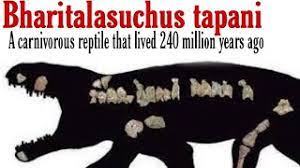
An international team of paleontologists has thrown light on a carnivorous reptile that lived 240 million years ago (Bharitalasuchus tapani).
- The Team studied some of the fossil specimens stored at the Indian Statistical Institute, Kolkata.
- In the mid 20th century, researchers from the Institute carried out extensive studies on rocks of the Yerrapalli Formation in what is now Telangana, uncovering several fossils.
- This reptile belongs to a genus and species previously unknown to science. They named it Bharitalasuchus tapani (BT).
- BT were robust animals with big heads and large teeth, and these probably predated other smaller reptiles.
- They were approximately the size of an adult male lion and might have been the largest predators in their ecosystems.
- In the Telugu language, Bhari means huge, Tala means head, and Suchus is the name of the Egyptian crocodile-headed deity.
- The species is named after paleontologist Tapan Roy Chowdhury in honour of his contribution to Indian vertebrate paleontology and especially his extensive work on the Yerrapalli Formation tetrapod fauna.
- Further studies revealed that the reptile belonged to a family of extinct reptiles named Erythrosuchidae.
- Erythrosuchids are known from Lower-Middle Triassic rocks of South Africa, Russia, and China, and there have been preliminary reports from the Middle Triassic Yerrapalli Formation of south-central India.
Pyrostria laljii: Genus Of The Coffee Family:
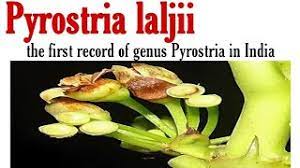
Pyrostria laljii, a new species which belongs to the genus of the coffee family has recently been discovered from the Andaman Islands.
- A new species of pokeweed named Rivina andamanensis was also discovered.
- Andaman and Nicobar is a group of 572 islands and islets that are rich and unique in terms of plant diversity in India.
- It is the first record of the genus Pyrostria in India. It is a 15-meter-tall tree.
- Plants belonging to genus Pyrostria are usually found in Madagascar but the recently discovered species is new to science.
- While the genus Pyrostria is not found in India, there are several genera from the family Rubiaceae that are common in India.
- These plants, including cinchona, coffee, adina, hamelia, ixora, gallium, gardenia, mussaenda, rubia, morinda, have high potential for economic value.
- Named Pyrostria laljii after Lal Ji Singh, Joint Director, Andaman and Nicobar Regional Centre, Botanical Survey of India.
- It has been assessed as ‘Critically Endangered’ based on the International Union for Conservation of Nature’s (IUCN) Red List criteria.
Parliamentary Privileges:
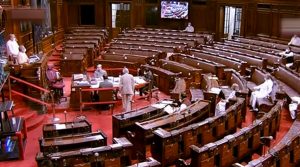
Congress leader Jairam Ramesh, who chairs the Parliamentary Standing Committee on science and technology, has moved a privilege motion against news channel Times Now for “falsified and mischievous” reporting of the proceedings of the panel’s meeting.
Parliamentary Privileges:
- Parliamentary Privileges are certain rights and immunities enjoyed by members of Parliament, individually and collectively, so that they can “effectively discharge their functions”.
- Article 105 of the Constitution expressly mentions two privileges, that is, freedom of speech in Parliament and right of publication of its proceedings.
- Apart from the privileges as specified in the Constitution, the Code of Civil Procedure, 1908, provides for freedom from arrest and detention of members under civil process during the continuance of the meeting of the House or of a committee thereof and forty days before its commencement and forty days after its conclusion.
Motion against breaches:
- When any of these rights and immunities are disregarded, the offence is called a breach of privilege and is punishable under law of Parliament.
- A notice is moved in the form of a motion by any member of either House against those being held guilty of breach of privilege.
Moderna’s Vaccine:
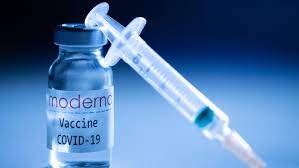
The Drugs Controller General of India (DCGI) has granted permission to Mumbai-based pharma major Cipla to import Moderna’s COVID-19 vaccine, making it the fourth vaccine in the country to be given the emergency use authorisation (EUA).
- India has made available three COVID vaccines — Covaxin, Covishield and Sputnik.
- The vaccine, mRNA-1273, manufactured by Moderna TX, Inc., is a two-dose vaccine with the shots to be given 28 days apart.
- Messenger RNA vaccines, also called mRNA vaccines, are a new vaccine technology platform.
- The mRNA vaccines teach human cells how to make a protein, or even just a piece of a protein of the virus, triggering an immune response inside human bodies.
- The benefit of mRNA vaccines, like all vaccines, is that those vaccinated gain protection without ever having to risk the serious consequences of getting sick with Covid-19.
- Vaccines and medicines, and even diagnostic tests and medical devices, require the approval of a regulatory authority before they can be administered.
- In India, the regulatory authority is the Central Drugs Standard Control Organisation (CDSCO).
- For vaccines and medicines, approval is granted after an assessment of their safety and effectiveness, based on data from trials.
Vaccine Passport Programme:
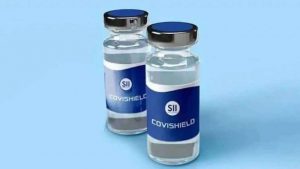
Covishield, manufactured by Serum Institute of India, is not among the vaccines which have been approved by the European Medicines Agency (EMA) for its “vaccine passport” programme that allows free movement of people in and out of Europe.
- The EMA list only includes four vaccines now Vaxzevria (Oxford-AstraZeneca), Comirnaty (Pfizer-BioNTech), Spikevax (Moderna) and Janssen (Johnson & Johnson).
- The EU Digital Covid Certificate, or the “green pass” as it is popularly known, has been created to restore freedom of travel for the public and remove the barriers on entry placed due to the pandemic.
- It is a digital proof that a person has either been vaccinated against Covid-19, or received a negative test result, or recovered from the viral infection. The document is valid across all EU countries.
- While the “green pass” is expected to make the experience of travel hassle-free for people by doing away with restrictions, it is not absolutely compulsory.
- Serum Institute of India has not applied for Covishield’s approval.
- Though Vaxzevria has been among the vaccines approved by EMA, Covishield, which is derived from AstraZeneca’s shot, is not on the list.
- This is because the EMA takes into consideration local manufacturing facilities. Even if the vaccine is the same, different manufacturers of the same product need to submit separate applications for approval from EMA.
- Though the EU has made it clear that the “green pass” will not be compulsory, the issue has once again raked up the larger debate on concerns around privacy and ethics.
- The ‘vaccine passport’ has been largely touted to be a ticket back to normalcy, but it has given rise to larger concerns over intrusion, privacy and a curb on the right to free movement.
- At the recent meeting of G7 countries, Union Health Minister Harsh Vardhan said that India was “strongly opposed to a ‘vaccine passport’ at this juncture”.




